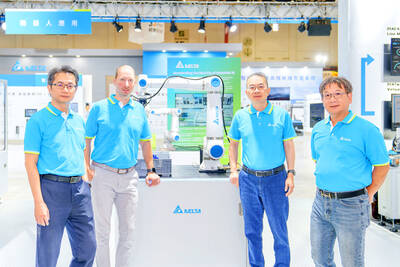Eyeing the deep pockets of younger people, Sony Corp yesterday announced the debut of a new laptop series priced at a "comfortable price point."
"The target buyers are rich and price conscious," Hiroyuki Oda, Sony Taiwan Ltd's division president, told a product launch yesterday.
Retailing for NT$39,800, the Vaio C15 series comes in two colors: cappuccino black and seashell white. The laptops are equipped with Core 2 Duo processors, 512MB of memory, 80GB storage and a standalone graphics card. The 13.3-inch widescreen machines are slightly bulky at 2.3kg with battery.
CLOSING THE GAP
Sony hopes that the launch of C15 series will be able to close the gap with its rivals in the mainstream notebook sector by pricing the new computers at between NT$30,000 and NT$40,000, Oda said.
Sony has been selling its Vaio at NT$20,000 more than the average market price for mainstream notebooks.
In the first quarter of last year, the average Vaio notebook sold for NT$68,200, compared to NT$46,000 for the market standard, according to Sony's statistics.
Vaio's average price declined to NT$57,600 in the second quarter of this year, still higher than NT$39,600 for general laptops.
Despite its higher price tag the Sony products have enjoyed brisk sales in Taiwan, selling around 7,000 laptops each quarter, making it the No. 6 brand in the country.
Asustek Computer Inc (
BATTERY BROUHAHA
Sony appears confident that the wave of recent recalls of its computer batteries will not hurt its personal-computer operations.
Top PC makers, including Dell Inc and Apple Computer Inc, have announced recalls of up to 9.6 million Sony batteries after reports that the batteries could overheat and catch fire.
Sony announced last week that it planned to start selling the world's lightest notebook -- the "type G" Vaio -- next month in Japan, in a bid to boost its presence among business users.
Weighing just 898g, the "type G" Vaio comes with a 12.1-inch screen.

SETBACK: Apple’s India iPhone push has been disrupted after Foxconn recalled hundreds of Chinese engineers, amid Beijing’s attempts to curb tech transfers Apple Inc assembly partner Hon Hai Precision Industry Co (鴻海精密), also known internationally as Foxconn Technology Group (富士康科技集團), has recalled about 300 Chinese engineers from a factory in India, the latest setback for the iPhone maker’s push to rapidly expand in the country. The extraction of Chinese workers from the factory of Yuzhan Technology (India) Private Ltd, a Hon Hai component unit, in southern Tamil Nadu state, is the second such move in a few months. The company has started flying in Taiwanese engineers to replace staff leaving, people familiar with the matter said, asking not to be named, as the

The prices of gasoline and diesel at domestic fuel stations are to rise NT$0.1 and NT$0.4 per liter this week respectively, after international crude oil prices rose last week, CPC Corp, Taiwan (台灣中油) and Formosa Petrochemical Corp (台塑石化) announced yesterday. Effective today, gasoline prices at CPC and Formosa stations are to rise to NT$27.3, NT$28.8 and NT$30.8 per liter for 92, 95 and 98-octane unleaded gasoline respectively, the companies said in separate statements. The price of premium diesel is to rise to NT$26.2 per liter at CPC stations and NT$26 at Formosa pumps, they said. The announcements came after international crude oil prices

STABLE DEMAND: Delta supplies US clients in the aerospace, defense and machinery segments, and expects second-half sales to be similar to the first half Delta Electronics Inc (台達電) expects its US automation business to remain steady in the second half, with no signs of weakening client demand. With demand from US clients remaining solid, its performance in the second half is expected to be similar to that of the first half, Andy Liu (劉佳容), general manager of the company’s industrial automation business group, said on the sidelines of the Taiwan Automation Intelligence and Robot Show in Taipei on Wednesday. The company earlier reported that revenue from its automation business grew 7 percent year-on-year to NT$27.22 billion (US$889.98 million) in the first half, accounting for 11 percent

A German company is putting used electric vehicle batteries to new use by stacking them into fridge-size units that homes and businesses can use to store their excess solar and wind energy. This week, the company Voltfang — which means “catching volts” — opened its first industrial site in Aachen, Germany, near the Belgian and Dutch borders. With about 100 staff, Voltfang says it is the biggest facility of its kind in Europe in the budding sector of refurbishing lithium-ion batteries. Its CEO David Oudsandji hopes it would help Europe’s biggest economy ween itself off fossil fuels and increasingly rely on climate-friendly renewables. While